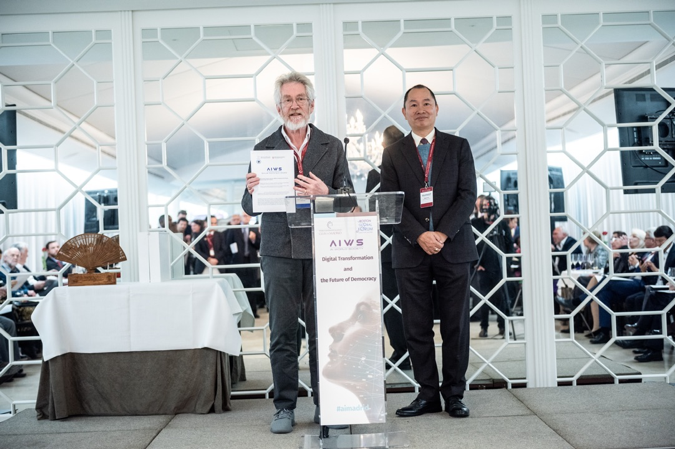
by Editor | Jan 20, 2020 | News
Professor Alex Sandy Pentland, MIT, one of 7 most powerful data scientists, co-founder of the AIWS Social Contract and co-founder of the AIWS Innovation Network, contributes the first words for writing of the AIWS Social Contract:
“Over centuries society has constructed a social contract between government and citizens. First included was land, then capital, then finally labor. Now data is a core part of society, immensely valuable and critical for proper functioning of a modern society, and so data must be integrated into the social contract. Data should be regarded as a first-class resource belonging to citizens, like labor or capital or land, and just as with these older citizen resources we need to construct institutions and laws that control rights, ownership, and use.”
The final version of AIWS Social Contract will be presented at Policy Dialog, co-organized by the Boston Global Forum and World Leadership Alliance-Club de Madrid at Harvard and MIT on April 28-29, 2020.
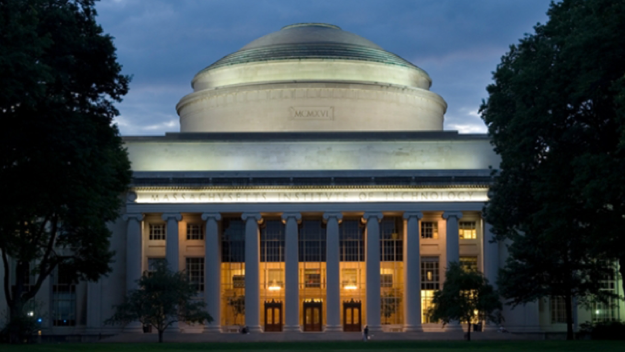
by Editor | Jan 20, 2020 | News
The pharma company will work with MIT’s School of Engineering to establish an education program focused on developing new machine learning approaches to drug development and more.
The program, based at MIT’s Abdul Latif Jameel Clinic for Machine Learning in Health, or J-Clinic – which specializes in developing new healthcare AI tools – is funded with a three-year investment from Takeda and aims to leverage the expertise of both organizations.
With the collaboration, MIT will gain access to pharmaceutical infrastructure and expertise, and develop new educational program through J-Clinic that will support MIT faculty, students, researchers, and staff in their approach to AI development. The new program will combine algorithm and hardware innovations, and create multidimensional collaborations between academia and industry.
The MIT-Takeda Program will focus on funding as many as 10 flagship research projects per year in the areas of machine learning and health, including diagnosis of disease, prediction of treatment response, development of novel biomarkers, process control and improvement, drug discovery, and clinical trial optimization.
According to AI World Society (AIWS), AI technology for medical application can be a force for helping people achieve well-being and happiness, unleash their potential, obtain greater freedom, relieve them of resource constraints and solve important issues, such as SDGs.
The original article can be found here.

by Editor | Jan 20, 2020 | News
A roadblock to scale: the global sprint towards AI, a study of 4,514 senior business decision-makers with some knowledge/influence over their company’s IT decisions, reported that there is a skills gap that represents a significant roadblock to broad business deployment of AI. The executives also said data silos hinder progress in AI projects.
The study, conducted by Morning Consult for IBM, showed that 37% of the executives surveyed are concerned that limited AI expertise or knowledge is hindering successful AI adoption at their businesses. Other barriers cited include increasing data complexities and silos (31%) and lack of tools for developing AI models (26%).
Globally, 22% of the survey’s respondents said they are not currently using or exploring the use of AI. But professionals whose companies are currently deploying AI are much more likely to report investment across the board.
Globally, 78% of the executives surveyed said it is very or critically important that they can trust that their AI’s output is fair, safe and reliable. Explainable AI was high on the agenda for 83% of global respondents.
Rob Thomas, general manager at IBM Data and AI, said: “Based on our interactions and the results of this study, we expect to see organizations not only adopt AI, but scale it across their enterprises, by building/developing their own AI, or putting ready-made AI applications to work.”
In 2018, the Michael Dukakis Institute for Leadership and Innovation (MDI) established the Artificial Intelligence World Society (AIWS) and invited participation and collaboration with think tanks, universities, non-profits, enterprises, and other entities that share its commitment to the constructive and development of AI.
The original article can be found here.
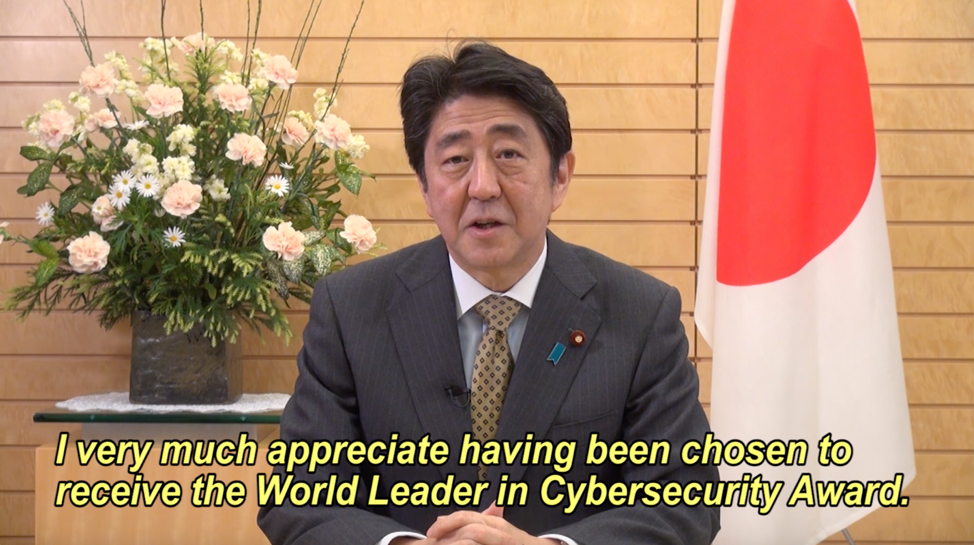
by Editor | Jan 12, 2020 | News
Japanese Prime Minister Shinzo Abe on Sunday sought cooperation from Saudi Arabia to ensure stability in the Middle East amid heightened U.S.-Iran tensions.
In his meeting with Prince Faisal bin Farhan, who serves as foreign minister, Abe said he is “deeply worried” about the Middle East situation and Tokyo is aiming to help reduce the tensions through diplomatic efforts.
Abe also explained Japan’s planned dispatch of a Self-Defense Forces destroyer and patrol planes to the region to safeguard commercial shipping, according to the Foreign Ministry.
In response, the Saudi foreign minister hailed the decision, saying that it is the responsibility of “all countries concerned” to secure safe navigation, the ministry said.
Abe also held talks with Saudi King Salman ahead of his meeting with Crown Prince Mohammed bin Salman later Sunday.
The Boston Global Forum presented Prime Minister Shinzo Abe with the Award of World Leader for Peace, and Security on Global Cybersecurity Day December 12, 2015 at Harvard University Faculty Club.
The original article can be found here.
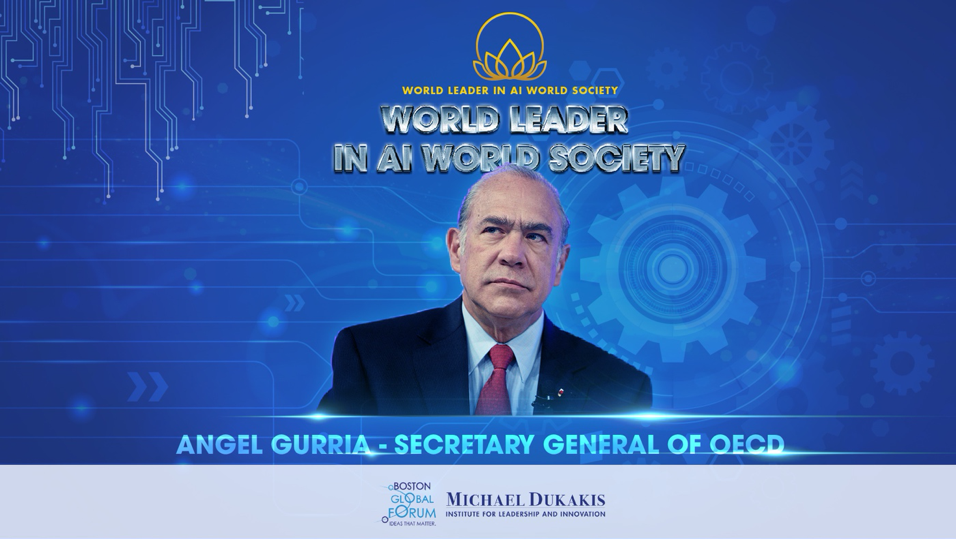
by Editor | Jan 12, 2020 | News
Now, leaders of BGF and AIWS Innovation Network (AIWS-IN) are nominating to honor World Leader in AI World Society Award 2020. The first winner was Angel Gurria, Secretary General of OECD for 2018, and the second winner was father of Internet Vint Cerf for 2019.
The World Leader in AI World Society Award 2020 will be presented at the conference co-organized by World Leadership Alliance-Club de Madrid and the Boston Global Forum, at Harvard University from April 28-29, 2020.
World Leader in AI World Society is a part of AIWS-IN. Winners of this award will become a member of board of leaders of AIWS-IN, the network of more than 100,000 professors, scholars, innvators, experts of top universities in the world.
Link: https://aiws.world/world-leaders-in-aiws/

by Editor | Jan 12, 2020 | News
Leaders and experts of EY, MIT, World Bank, the Boston Global Forum, and New America are discussing with each other to establish the Alliance for Prosperity.
An Alliance is taking shape between private and public stakeholders that aims to support transforming tax systems in developing countries through data science and technology innovations.
The founding members of the Alliance are: Boston Global Forum, EY, MIT Connection Science, New America and the World Bank. Over time, the Alliance will add other members that who can contribute to its mission. With countries in the lead fordire need of solution deployment of solutions on the ground, the Alliance will promote initiatives that contribute to: raising additional revenue, curbing corruption, and increasing fairness and taxpayer trust.
The Alliance will pursue a wide range of activities to getachieve buy-in, solution development, capability to deploy, and funding of data science and technology innovations. This requires raising awareness among stakeholders including decision -makers in developing countries, taxpayers and developers of technology solutions. Awareness needs to result in well-defined demand for approaches solutions that can change fundamental tax outomes. Alliance partners have own capacity to develop and deploy such solutions but a key activity will be to bring country demand to a wider group of developers, with as a core requirement that softwares Solutions should endeavor to lower barriers to adoption by adhering to governance principles that foster transparency and consistency: contributing to ‘free or open- source libraries or other intellectual property transfer, promoting ’ interoperabilityle, and and utilizing open standards / transparentprotocols where appropriate. Revenue administrations, ministries of finance and other key stakeholders need to be willing and ready for new solutions, which requires workforce development and addressing of institutional political economy bottlenecks. Finally, the Alliance will work with funders to secure financial resources for larger-scale projects and sustain the work of the Alliance.
The Alliance will initiate its work in 2020 with a launch in January 2020 at the World Economic Forum (WEF) in Davos.
This initiative as a model of AI-Government, a part of AI World Society Concepts.
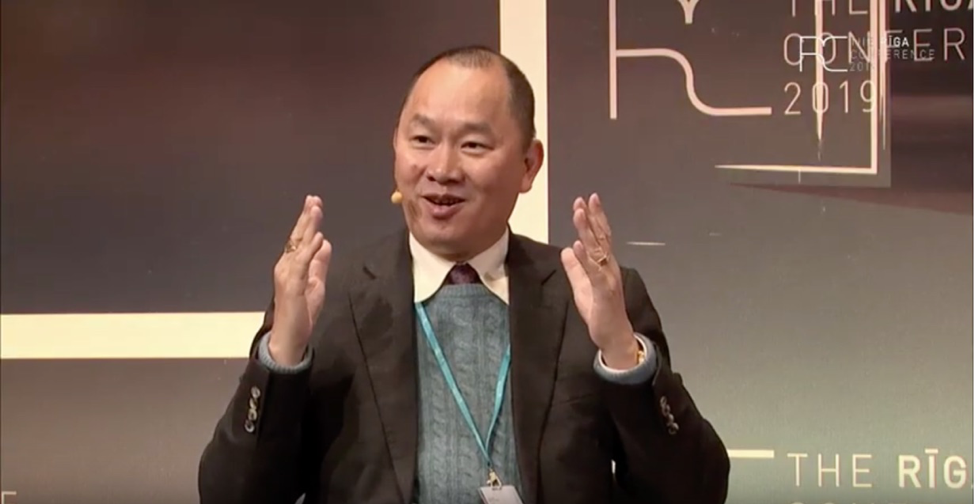
by Editor | Jan 12, 2020 | News
With the theme “Innovating Decisive Leadership through Times of Disruption”, Horasis Global Meeting will be organized from 28-31 March 2020 in Cascais, Portugal.
Co-hosts:
City of Cascais
Government of Portugal
President José Manuel Barroso, Vice Chairman, Goldman Sachs International; Former President, European Commission, Portugal, is the co-chair of the event.
Mr. Nguyen Anh Tuan, CEO of the Boston Global Forum, will be chair of the session The Progress on Global Commitments. He will present benefit and advantages from AIWS Innovation Network, a network of more than 100,000 professors, scholars, innovators, experts of top universities such as Harvard, MIT, Stanford, Princeton, Yale, Carnegie Mellon, Stanford, Cambridge, Oxford, etc., as Uber model of intellectual. There are topics linked to AI will be presented and discussed at Horasis Global Meeting, as well as many leaders of governments, distinguished scholars of universities, and business leaders who will join the event.

by Editor | Jan 12, 2020 | News
Take the camera trap, a pretty common technique used to study wildlife habits and biodiversity — and one that has been supported by an array of big-name tech companies. Except what researcher has the time or bandwidth to analyze thousands, let alone millions, of images? Enter systems such as Wildlife Insights, a collaboration between Google Earth and seven organizations, led by Conservation International.
Wildlife Insights is, quite simply, the largest database of public camera-trap images in the world — it includes 4.5 million photos that have been analyzed and mapped with AI for characteristics such as country, year, species and so forth. Scientists can use it to upload their own trap photos, visualize territories and gather insights about species health.
Here’s the jaw-dropper: This AI-endowed database can analyze 3.6 million photos in an hour, compared with the 300 to 1,000 images that you or I can handle. Depending on the species, the accuracy of identification is between 80 and 98.6 percent. Plus, the system automatically discounts shots where no animals are present: no more blanks.
The net effect: faster analysis, faster insights. And let’s be frank, the rapidity with which global temperatures are rising, and habitats and unique species are disappearing, demands that the sustainability community move much faster than it has to make decisions and take action. If 2019 told us anything, it was that we are running out of time to act on climate change. Indeed, almost three-quarters of business decision-makers believe AI will be instrumental in driving solutions that improve environmental sustainability, according to research published last year by Intel.
At the same time, we are certainly right to be cautious about the potential side effects of AI. That theme comes through loud and clear in five AI predictions published by IBM in mid-December. Two resonate with me the most: first, the idea that AI will be instrumental in building trust and ensuring that data is governed in ways that are secure and reliable; and second, that before we get too excited about all the cool things AI might be able to do, we need to make sure that it doesn’t exacerbate the problem. That means spending more time focused on ways to make the data centers behind AI applications less energy-intensive and less-impactful from a materials standpoint.
From an ethical standpoint, I also have two big concerns: first, that sufficient energy is put into ensuring that the data behind the AI predictions we will come to rely on more heavily isn’t flawed or biased. That means spending time to make sure a diverse set of human perspectives are represented and that the numbers are right in the first place. And second, we must view these systems as part of the overall solution, not replacements for human workers.
Regarding to AI Ethics, AI World Society (AIWS) initiated and promoted to design AIWS Ethics framework within four components including transparency, regulation, promotion and implementation for constructive use of AI.
The original article can be found here.
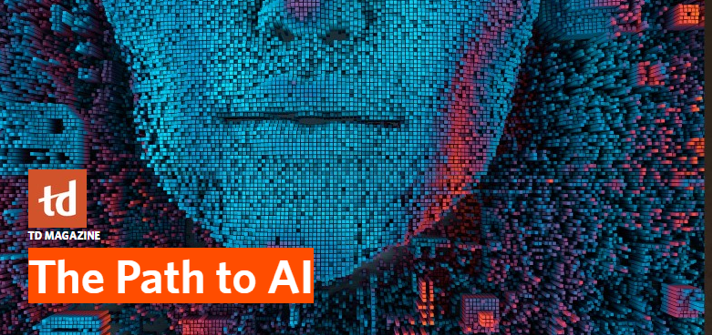
by Editor | Jan 12, 2020 | News
Artificial Intelligence (AI) is poised to be the next world-altering technology. While there is still plenty of work to be done to capitalize on AI’s ultimate potential, the technology is already becoming a ubiquitous part of everyday life: entertainment and shopping recommendations, text message autocomplete, voice assistants, and even traffic lights. They all use AI to shape the user experience and improve productivity.
AI is changing how work gets done. For example, smart assistants can now handle the basic but annoying chore of scheduling team meetings. And in warehouses, robots algorithmically scurry about gathering products for their human counterparts to ship. Regardless of the industry, knowledge and skill requirements are changing quickly for anyone who wants to play a role in the future of work.
Research from EY shows that AI is increasing workplace operational efficiency and helping organizations make faster, smarter decisions. The generalized fear that AI will take away all human jobs may have subsided, but McKinsey research indicates that up to 50 percent of job tasks are technically automatable. Forbes revealed that 80 percent of CEOs see AI as a critical component of their digital transformation strategy.
According to Michael Dukakis Institute for Leadership and Innovation (MDI), AI technology can be a force for helping people achieve well-being and happiness, unleash their potential, obtain greater freedom, relieve them of resource constraints and arbitrary/inflexible rules and processes, and solve important issues, such as SDGs.
The original article can be found here.








